Have I ever re-read a book? Yes, of course I have.
(Although not so much lately, as I have so many books in my to-read pile. I have found myself accidentally re-reading books, because I find them on my Kindle, start reading, and don’t remember that I’ve read them before.)
I’ve actually had that happen a couple of times this year: I only realise I’ve already read the book when I go to add it to my Goodreads list and find it’s already on my Read shelf.
In one case, I thought the book was average and forgettable, so the fact I’d already read it didn’t surprise me (especially when I read my review, which essentially said the book was forgettable).
But the other did surprise me, because I enjoyed it much more the second time around.
That book was The Edge of Mercy by Heidi Chiavaroli.
I’d put off reading it several times because while the book was described as dual timeline, the cover made it look like a historical. That gave me the impression it was set in two historical timelines.
That didn’t interest me because I’ve been going through a contemporary phase (I can’t be the only person who goes through reading phases). Yes, I could have read the actual book description which would have made it clear the book was a contemporary, but that is one of the disadvantages of reading on Kindle: there isn’t a back cover with a book description.
Anyway, once I started it (again), I realized The Edge of Mercy is actually a contemporary story that has flashbacks to the past through a diary.
Here’s the Amazon description:
Two women, three hundred years apart, must face the devastation of all they hold dear…

Determined not to fail her friend, Sarah pieces together the story of her neighbor’s ancestor, Elizabeth Baker, a young colonist forced into an unwanted betrothal but drawn to a man forbidden by society.
While Sarah’s family teeters on the edge of collapse, her world is further shaken by the interest of a caring doctor and a terrible accident that threatens a life more precious than her own.
Inspired by the unconditional love she uncovers in Elizabeth’s story, Sarah strives to forgive those who’ve wounded her soul. But when light shines on the dark secrets of her neighbor’s past and the full extent of her husband’s sins, will looking to a power greater than herself rekindle lost hope?
The Edge of Mercy reminded me of The Scarlet Thread by Francine Rivers.
The heroine married young, and focused on raising a family while her husband built a successful business. Now her husband has now left her for another woman.
As with The Scarlet Thread, the writing in The Edge of Mercy was excellent, and the story focusses on the woman: on her reaction to being suddenly single, on an external event (her neighbor dying) that pushes her to look beyond herself, and on her eventual (but subtle) reconciliation with God through the story. It’s also a story of the main character, Sarah, as she tries to find her identity now her marriage has ended. As she says on the first page:
I … couldn’t imagine who I was without Matt to define me.”
I think that’s what got my attention this time: a main character with a mistaken view about her identity. We should not identify ourselves purely in relation to those around us. We are more than someone’s daughter or wife or mother or colleague or friend.
As Christians, our identity is in Christ.
And I wanted Sarah to discover that …


